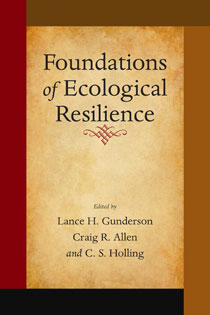"Foundations of Ecological Resilience is a set key papers that capture the major conceptual advances and their application in the development of resilience science. Gunderson, Allen, and Holling provide overview chapters that place these classics in context. This volume is essential reading for students and scholars applying resilience theory to modern issues."
F. Stuart Chapin III, University of Alaska, Fairbanks
"It is exciting to hold in one's hands a single volume containing thirty-five years of the key article s on ecological resilience. This book will help serious students to understand the foundations, and the cutting edges, of research on ecological resilience."
Elinor Ostrom, Indiana University and Arizona State University
"This is a book for our turbulent times. It is about expecting the unexpected. It marks a transformation away from misleading equilibrial theories of ecology and economics that still dominate today. While realistic about the magnitude of the ecological problems humans face, Foundations of Ecological Resilience offers principles to guide the management and governance of the unpredictable ecosystems in which we live."
Nick Abel , CSIRO Sustainable Ecosystems, Canberra, Australia
"Buzz Holling's seminal 1973 paper revolutionized the theory of management of environmental systems, emphasizing forces that confer resilience in the face of disturbance. Resilience theory has matured into a movement in ecological and economic theory and fundamentally influencing management. This is an essential collection of key papers in the evolution toward a science of sustainability. "
Simon Levin, Princton University
"I will start by saying I wish this book had been published ten years earlier—it would have saved a lot of arguments over what terms such as resilience, stability, elasticity, resistance all mean. ... So, too, will this volume be a classic."
Quarterly Review of Biology

